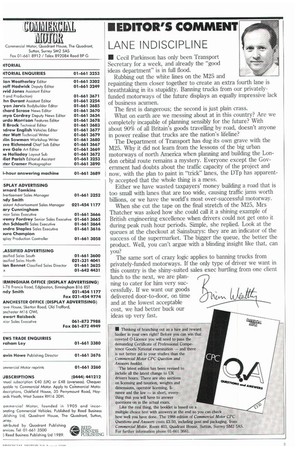LANE INDISCIPLINE
Page 5

If you've noticed an error in this article please click here to report it so we can fix it.
• Cecil Parkinson has only been Transport Secretary for a week, and already the "good ideas department" is in full flood.
Rubbing out the white lines on the M25 and repainting them closer together to create an extra fourth lane is breathtaking in its stupidity. Banning trucks from our privatelyfunded motorways of the future displays an equally impressive lack of business acumen.
The first is dangerous; the second is just plain crass. What on earth are we messing about at in this country? Are we completely incapable of planning sensibly for the future? With about 90% of all Britain's goods travelling by road, doesn't anyone in power realise that trucks are the nation's lifeline?
The Department of Transport has dug its own grave with the M25. Why it did not learn from the lessons of the big urban motorways of north America when planning and building the London orbital route remains a mystery. Everyone except the Government had doubts about the traffic capacity of the project and now, with the plan to paint in "trick" lanes, the DTp has apparently accepted that the whole thing is a mess.
Either we have wasted taxpayers' money building a road that is too small with lanes that are too wide, causing traffic jams worth billions, or we have the world's most over-successful motorway.
When she cut the tape on the final stretch of the M25, Mrs Thatcher was asked how she could call it a shining example of British engineering excellence when drivers could not get onto it during peak rush hour periods. Simple, she replied. Look at the queues at the checkout at Sainsburys: they are an indicator of the success of the supermarket. The bigger the queue, the better the product. Well, you can't argue with a blinding insight like that, can you?
The same sort of crazy logic applies to banning trucks from privately-funded motorways. If the only type of driver we want in this country is the shiny-suited sales exec hurtling from one client lunch to the next, we are plan ning to cater for him very successfully. If we want our goods delivered door-to-door, on time and at the lowest acceptable cost, we had better buck our ideas up very fast.




































































































